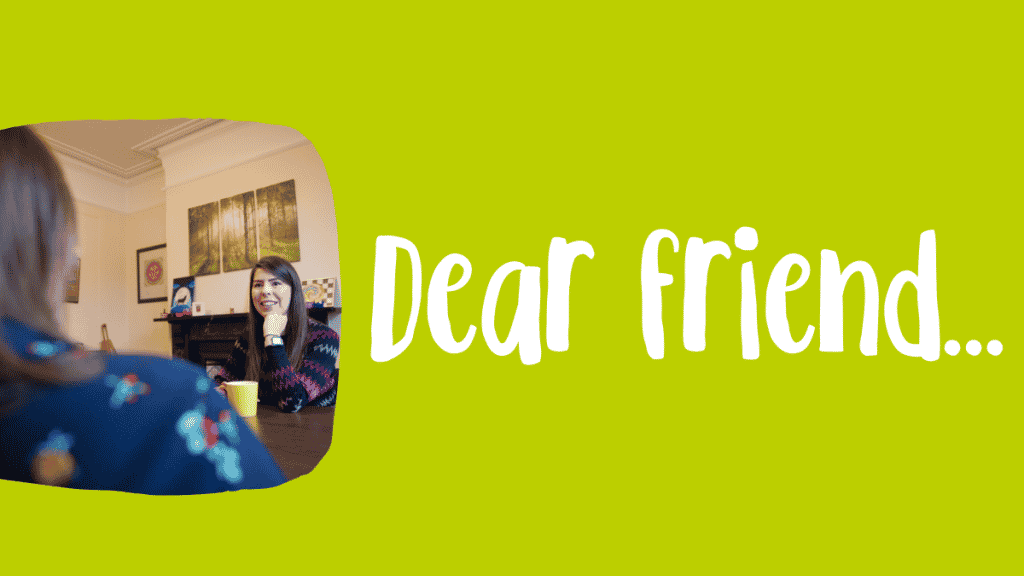We continue with our blog series, ‘Dear Friend…’ where volunteer and blogger Kara will be answering some of the mental health and wellbeing questions we have during this challenging time. This week’s questions is about increased anxiety now that lockdown restrictions are being lifted.
With Government restrictions lifting, the thought of having to go back to ‘normal’ scare me and it is affecting my anxiety. How can I cope with this change and the pressure to see friends and family and go out?
Hi Friend
I can empathise wholeheartedly with your anxious feelings regarding the latest government restriction announcements. The lockdown ‘stay at home’ message was clear but the lifting of restrictions is much less clear and in addition to this they’re dependant on what happens next in terms of the virus, so the restrictions are subject to change and that’s a difficult idea to cope with.
Interestingly there’s some science behind these feelings. The virus hasn’t gone so we still know it is a potential threat. Psychologically, the brain will respond by increasing our sense of danger when we’re in contact with that perceived threat in future. So the thought of re-entering society without the threat being eliminated could easily cause an increase in anxious feelings. Connection through facial expressions and speech could have alleviated those feelings, but with faces being hidden behind masks and social distancing measures still in place, that contact can be difficult to achieve. People may also fear to come into contact with the virus or be experiencing high levels of social anxiety after perhaps finding a degree of comfort in the enforced social restrictions. Regular low-key interaction is a recovery focus for those of us with anxiety, but that was heavily restricted during lockdown so we’re possibly a bit out of practice! Some people may have lost their sense of routine or relationships could have changed. Some of us have had quality time with the family, where others have had problems within their relationship coming to light. There just isn’t a ‘typical’ feeling for any stage of the lockdown, I’m afraid!
So, what can we do to cope with the change?
1. Build up activity steadily and slowly
Things are a little different in society, so take some time to reflect on that and expect the unexpected with your emotions. Thoughts are often the link behind these difficult emotions so it may be helpful to put some of your counselling or group therapy techniques into practice. Thoughts flow in and out of our minds unbidden so learning to let them go is a useful technique to master. This quick video is worth a look if you’re unsure how.
Second Step’s website and YouTube channel also host a wealth of helpful sessions to use as resources for coping with anxiety, depression, or extreme emotions. here are video from Sophie S on coping with change and distress tolerance. There is also a particularly relevant session to boost your mood while looking forward towards your next stage of wellbeing.
2. Keep enjoying any hobbies and interests you’ve started in lockdown
I know a lot of us at Second Step have had the space to develop new interests or habits, and these are worth keeping in your life wherever possible. It may be that you need to devise a new routine or schedule to keep doing what you’re enjoying but hobbies can be adapted and alternative platforms or sessions are often available. Creative pursuits and exercise, in particular, can make a big difference in wellbeing so they could help keep you well as you adapt to change once again.
3. Remember the wellbeing basics
Mindfulness techniques, eating for wellness, regular exercise, and good sleep hygiene are your essential coping tools, they make up a strong basis for staying well, so don’t forget these.
4. Connect with others
Do try to share your worries with a friend or family member or try Second Step’s peer/ phone support.
You can also try our wellbeing sessions and online groups – available for all service users of secondary mental health services in Bristol or North Somerset. We still have room for newbies, referrals are via self or professional referral forms which are available on our website. We offer a comprehensive selection of wellbeing sessions, creative pursuits (art/music/writing), and group café sessions, but you’ll just need to make your own coffee! We use zoom, which is a simple platform to download and use. Our Second Step Wellbeing Colleges Facebook page is also open to everybody, hosting some really useful content and support.
I hope this has helped, my friend.
North Somerset sessions and referral
Bristol Wellbeing College sessions and referral
Support is also available from the Mind website.

